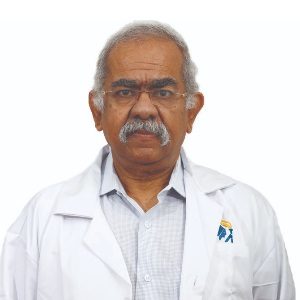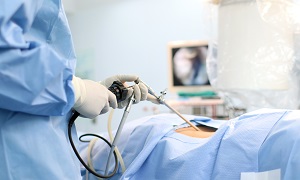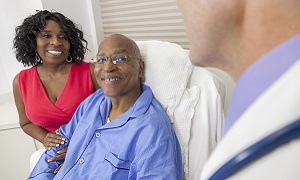Best Doctors in India for J-Pouch Surgery
- Surgical Gastroenterologist, Chennai, India
- Over 27 years’ experience
Profile Highlights:
- Dr. Surendran R is an experienced gastroenterologist from Chennai, Tamil Nadu.
- He has been rewarded for his contributions to the field several times. He received The Best Doctor award from the Tamil Nadu government (2002) in his name.
- Being a gastroenterologist, he specializes in treating patients with problems such as Bowel Obstruction, Pancreatic diseases, Esophagus disorders, Fistula treatment, etc.
- Gastroenterologist and GI Medicine Specialist, Chennai, India
- Over 23 years’ experience
Profile Highlights:
- Dr. Revathy Shanmugam is an experienced Gastroenterologist in Tamil Nadu, having an experience of 23 years in the management of GI disorders, Training & Teaching.
- She is highly skilled in the services like Liver Disease Treatment and Inflammatory Bowel Disease (IBD) Treatment.
- She has published various scholarly works in many National & International Publications of Medical Gastroenterology.
- Gastroenterologist and GI Medicine Specialist, Chennai, India
- Over 32 years’ experience
Profile Highlights:
- Dr. Hariharan Muthuswamy is a veteran Gastroenterologist and Hepatologist in India with 22 years of experience (specialist).
- Dr. Muthuswamy treated his patients with Non-Surgical Piles treatment, Liver Disease Treatment, Hepatitis E, Hepatitis A Treatment and Hepatitis B Treatment, Hemorrhoids Treatment, Colonoscopy, Stomach, and Intestinal Treatments, etc.
- He has a special interest in Capsule Endoscopy, Therapeutic Endoscopy, GERD, and Irritable Bowel Syndrome (IBS).
- Gastroenterologist and GI Medicine Specialist, Chennai, India
- Over 32 years’ experience
Profile Highlights:
- Dr. Mohan A T is a veteran GI medicine specialist in India with an experience of 32 years.
- Dr. Mohan, an alumnus of Madras University, is the Co-Ordinator of the Indian Society of Enteral and Parenteral Nutrition.
- He is an expert in treating Gastritis, acidity, Ulcerative Colitis, and many other Intestinal and bowel-related Treatments. In addition to these, he offers Colonoscopy, Gastroscopy, and Endoscopy.
- Gastroenterologist and GI Medicine Specialist, Chennai, India
- Over 15 years’ experience
Profile Highlights:
- Dr. Piramanayagam P is one of the young Gastroenterologists in India, having an experience of 15 years in the field.
- The doctor offer services like Gall Bladder (Biliary) Stone treatment, IBS treatment, Acidity Treatment, Endoscopy, and stomach and intestine dysfunction.
- He published many review articles and books under his name.
- Gastroenterologist and GI Medicine Specialist, Chennai, India
- Over 39 years’ experience
Profile Highlights:
- Dr. Sarojini Parameswaran is one of the renowned Gastroenterologist with an overall experience of 39 years.
- Dr. Parameswaran is brilliant and quick with diagnosis. She has 22 years of specialist experience.
- Gastroenterologist and GI Medicine Specialist, Chennai, India
- Over 24 years’ experience
Profile Highlights:
- Dr. Seshadri Venkatesh P is a well-known Gastroenterologist in India, having 24 years of experience in Stomach and Intestine disorders.
- Dr. Seshadri acquired proficiency in managing Bladder Cancer surgery, hemorrhoids, Irritable Bowel Syndrome (IBS) Treatment, etc.
- He holds membership in Tamil Nadu Medical Council.
- Gastroenterologist and GI Medicine Specialist, Chennai, India
- Over 40 years’ experience
Profile Highlights:
- Dr. Usha Srinivas is a Gastroenterologist in India with an experience of 40+ years in GI in medicine and academics.
- Patients visit her for consultation and treatment of abdominal pain, Gall Bladder (Biliary) Stone, Gastroenteritis, Jaundice, Colonoscopy, Steatosis, Constipation Treatment, Hepatitis C Treatment, Hepatitis E Treatment, Hemorrhoids Treatment, Piles Treatment (Non-Surgical), Gastritis Treatment, Ulcerative Colitis Treatment, and others.
- Gastroenterologist and GI Medicine Specialist, Chennai, India
- Over 18 years’ experience
Profile Highlights:
- Dr. Preethi M is one of the best gastroenterologists in India, with 18 years of expertise.
- Dr. Preethi received many awards for her contribution to the field.
- She offers consultation for Irritable Bowel Syndrome (IBS), Hemorrhoids, Endoscopy, female problems, and other gastrointestinal issues.
- Gastroenterologist and GI Medicine Specialist, Chennai, India
- Over 23 years’ experience
Profile Highlights:
- Dr. Ubal Dhus is a GI specialist doctor in South India who is proficiently managing Gastroenterological disorders for the past 23 years.
- He acquired his medical degree from Madras University, Chennai, and served people with Hemorrhoids Treatment, and Irritable Bowel Syndrome (IBS) Treatment.
Best Hospitals in India for J-Pouch Surgery
Venkateshwar Hospital, Dwarka, New Delhi
- City: New Delhi, India
Hospital Highlights:
- State-of-the-art technology and devoted healthcare professionals have been brought together under one roof at Venkateshwar Hospital to provide genuine medical care. The hospital’s professionals work together as a team to deliver the best possible treatment to their patients, using the most sophisticated equipment and information technology.
- Venkateshwar Hospital’s mission is to attain global excellence in healthcare by employing evidence-based, ethical clinical practices and cutting-edge technology by a team of highly skilled experts.
MGM Healthcare, Chennai
- City: Chennai, India
Hospital Highlights:
- Located in Chennai, India, MGM Healthcare is a top multispecialty hospital that provides all medical services under one roof.
- Since its founding in 2019, MGM Healthcare has quickly become a leading national referral centre, creating several innovative flagship initiatives.
- MGM Healthcare combines next-generation medical and digital technologies to provide better patient results.
- With 12 centres of excellence, more than 400 inpatient beds, 100 intensive care unit beds, and 24/7 emergency care, MGM Healthcare leaves no chance in redefining the patient experience in Chennai.
- MGM Healthcare boasts 250+ expert doctors across 30+ departments, including Cardiology, Pulmonology, Neurology, Obstetrics & Gynaecology, and more.
- They house 12 specialized Centres of Excellence, including Neurosciences, Orthopaedics, and Multi-Organ Transplantation.
- Their team of doctors, nurses, and paramedics works together to give every patient individualized treatment.
J-Pouch Surgery
Ileonala anastomosis surgery, which is commonly termed as a J-pouch surgery allows you to eliminate waste material normally after your entire large intestine is removed. The procedure involves constructing a J-pouch after your surgeon removes your colon and rectum.
This procedure avoids the need for a permanent opening in the abdomen i.e. stoma for passing any bowel movements.
Purpose
J-Pouch surgery is generally used for treating chronic ulcerative colitis and inherited conditions, like familial adenomatous polyposis, which carries a high risk of colon and rectal cancer.
In some instances, the procedure might be done when medications for treating ulcerative colitis are not successful in controlling the condition. It might also be done if precancerous changes or colon cancer is detected. The surgery is also used for treating colon cancer and rectal cancer.
Preparation
Before the procedure, you should talk with your doctor if you use alcohol, tobacco any other drugs, as these can affect your healing and recovery.
Your healthcare team will examine you before your surgery to mark the ileostomy site. Several factors can affect ileostomy site selection, which includes your natural skin folds, scars, navel, muscles in your abdomen, waistline, hip bone and visibility of the site when you are sitting. It is important to select the location properly so that you can care for the ileostomy after your surgery.
Procedure
During the procedure
J-pouch surgery is generally performed using minimally invasive (laparoscopic) methods. Instead of opening your abdomen with a relatively large incision (open surgery), surgeons usually prefer to create more than one smaller abdominal incision through which surgical instruments can be inserted. Next, your surgeon will also be inserting a laparoscope, which is a long, narrow tube with a camera at the tip.
During the surgery, first, the surgeon will remove your entire colon and rectum, preserving the muscles, sphincter and opening the anus at the end of your rectum.
Then he/she will construct a pouch-shaped like the letter J from the end of the small intestine. It will be attached to the opening at the end of the rectum. Next, for the elimination of waste, a temporary opening will be constructed in the abdominal wall, which is known as an ileostomy.
After around three months of healing, another procedure will be performed by your surgeon for closing the ileostomy, which will allow you to pass stool normally.
After the procedure
You will need to spend a little time in the hospital recovering as well as learning how to care for your ileostomy. You will likely receive pain medication or antibiotics as well.
Your doctor may recommend you to drink lots of fluids, which can be water or electrolyte replacement drinks, for avoiding dehydration as well as the loss of electrolytes. For around six to eight weeks, you will have to avoid certain kinds of foods, which can include raw fruits and vegetables, nuts, popcorn or any such food high in roughage. These kinds of foods can cause irritation in the anal area. If your stool is watery, then it is recommended that you eat certain kinds of foods such as rice, bananas or peanut butter.
For around four to six weeks after the surgery, try to avoid lifting or any kind of strenuous activity.
Results
For the majority of people, children and adults alike, they can see an improvement in their quality of life, after the surgery. However, people who are over 45 years of age might experience more incontinence and may need to go to the bathroom more frequently at night. On average, most of the people who undergo this procedure generally have around six bowel movements a day and one at night. It is estimated that around 90 percent of people who undergo this surgery, can be satisfied with the results.
Though this surgery can’t affect a woman’s ability to have a regular pregnancy and delivery, it might sometimes affect fertility.
Risks and complications
Though J-Pouch surgery is generally successful in treating your ulcerative colitis, sometimes there might be few complications that can require follow-up treatment. If you experience any of these conditions, inform your doctor immediately-
Pouchitis: Inflammation of the pouch can be considered the most common complication of j-pouch surgery and it is known to occur in around 50 percent of patients. It should occur within the first two years and is treatable with antibiotics. Diarrhea, fever, crampy abdominal pain, increased stool frequency, joint pain, and dehydration are the symptoms of this complication.
Small Bowel Obstruction: This is less common, but it can develop due to adhesions, which are fibrous bands that can occur between tissue and organs after your surgery. Around two-thirds of people who develop a small bowel obstruction should be able to be treated with bowel rest, such as not taking food for a few days. However, others might require surgery for removing the blockage. Symptoms of this complication include crampy abdominal pain, inability to pass stool, vomiting, and nausea.
There are few other possible conditions that might also develop post-surgery, which include pelvic abscesses and pouch fistulas.
Pouch failure, which generally occurs only in a tiny percentage of patients, requires surgery for removing the pouch and to create a permanent ileostomy.















